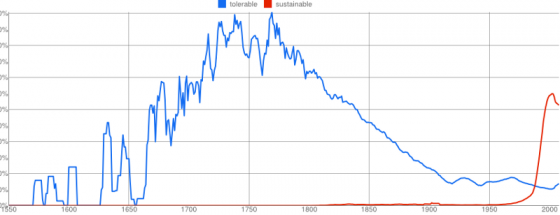 Sorry folks, but nothing on this earth is sustainable, even words. Brian argues the dire need for new words to replace ‘sustainable’ in our eco-English vocabulary.
Sorry folks, but nothing on this earth is sustainable, even words. Brian argues the dire need for new words to replace ‘sustainable’ in our eco-English vocabulary.
Peak oil came and went in 2008. Everyone knows this– with the possible exception of some US presidential candidates and one wildcat oil prospector in Cairo, Illinois. Most Green Prophet readers are also aware that the Nubian ibex, Persian fallow deer, Arabian gazelle, Egyptian tortoise and hundreds of other animal species may become extinct within our lifetimes.
When Persian Sufi poets and the Jewish King Solomon told us that, This too shall pass, they were speaking of everything. Solomon elaborated, that to everything there is a season and a time for every purpose under heaven. In other words, nothing on this earth is… sustainable. There, I’ve said it. This is the first time I’ve used the “s” word on Green Prophet. Yes, I know that I should conserve this overworked word but please let me explain its history and why I believe it is endangered.
The online etymology dictionary says: sustainable 1610s, “bearable,” from sustain + able Attested from 1845 in the sense “defensible;” from 1965 with the meaning “capable of being continued at a certain level.” Sustainable growth is recorded from 1965. Related: Sustainably.
So the original sixteenth century meaning was bearable or, as people from Cairo Illinois would put it, “just barely tolerable.” Here are some current headlines, translated to more closely match this original meaning:
Tolerable development “at the heart” of new planning policy
Maryland seeks tolerable fisheries certification for blue crab
United Nations conference on tolerable development to take place in Rio this summer.
- Sometimes I wonder whether environmentalists should strive for something slightly more inspiring than to be just barely tolerable. Maybe I’m not being fair. Let’s look at the naked root of this word: sustain late 13c., from O.Fr. sustenir “hold up, endure,” from L. sustinere “hold up, support, endure,” from sub “up from below” + tenere “to hold” (see tenet).
Thirteenth century. Wow, this word has already sustained seven centuries! How is it related to the word tenet? tenet “principle,” properly “a thing held (to be true),” early 15c., from L. tenet “he holds,” third person singular present indicative of tenere “to hold, to keep, to maintain” from PIE root *ten- “to stretch” (cf. Skt. tantram “loom,” tanoti “stretches, lasts;” Pers. tar “string;” Lith. tankus “compact,” i.e. “tightened;” Gk. teinein “to stretch,” tasis “a stretching, tension,” tenos “sinew,” tetanos “stiff, rigid,” tonos “string,” hence “sound, pitch;” L. tendere “to stretch,” tenuis “thin, rare, fine;” O.C.S. tento “cord;” O.E. thynne “thin”). Connection notion between “stretch” and “hold” is “to cause to maintain.” The modern sense is probably because tenet was used in M.L. to introduce a statement of doctrine. It says that Martin Luther is responsible for the modern usage of tenet. Can one person really bring a particular word usage into our language? Indeed, a Washington Post writer named Malcolm Gladwell described a competition between himself and fellow journalist Billy Booth. The writer who used the phrase “perverse and often baffling” in more published articles was declared the winner.
A Google search of this phrase now brings 160,000 hits.
- If one overlooks the perverse and often baffling relationship between the 15th century word tenet and the much older word, sustain, one can appreciate the wonderful diversity of this Persian, Greek, Lithuanian and Sanskrit word which relates to weaving on a loom or tantram.
- The roots of sustainable go back more than 700 years but there is evidence that it is being consumed at an alarming rate. A Google search of this word shows 230 million hits. Google news consumes another 40,000 per day. This Google N-GRAM graph shows the frequency of usage of the words tolerable and sustainable in books published between the years 1550 and 2008 CE:
The word tolerable began appearing in books towards the end of the 16th century and its usage grew rapidly until 1750 when, the world reached peak tolerable just in time for American colonialists to find King George’s taxes intolerable. From this point on, the world grew less tolerable each year as this word’s usage fell along with the number of passenger pigeons and sperm whales. The usage of the word sustainable is plotted in red. It follows an even steeper trajectory until it peaks and begins to fall. By 2008– the same year that peak oil slipped past us, it is obvious that our usage of sustainable is not sustainable.
What You Can do to Conserve this Word
Words are finite resource which can be consumed faster than they are renewed or replaced. The obvious remedy is for us to be conservative with our usage. A quick browse through the Internet and recent news articles shows that this word is being used to sell real-estate investment schemes, stock portfolios and burger-shaped pink slime. The word is also used for LEED certified architecture and consumer products, but it seldom describes anything designed to last more than a generation or two.
When you see such abuse of this valuable word, please remind people to help us conserve it.
The word sustainable continues to be useful but it is overworked and diluted. We need a powerful replacement. The Japanese word Setsuden helped Tokyo Electric Power Company turn off dozens of nuclear reactors, but it is too narrowly focused on saving electricity.
Seeking Sustainable Alternatives?
English is a mutt language and a bit of a kleptomaniac. It plagiarizes from every other language and seldom gives credit that, for example, kleptos is a Greek word and plagium is Latin. If two bored Washington Post reporters can introduce a silly phrase into the English language, I’m certain that Green Prophet can introduce a new word into the ecologist’s lexicon or perhaps recycle an Egyptian proverb into a meme which reminds us to take a longer view.
Some of our readers are fluent in Farsi, Persian, Hebrew, Turkish, Aramaic and a variety of other beautiful languages. I’m sure we can find a more sustainable replacement which can’t be misused to sell fast food or dodgy investment schemes and one which is truly focused on the long view, many generations hence. (Yes, I know hence is also a worn-out English word, but it works here.)
Please help us find a replacement for sustainable before it is too late.
I would like to thank my Grandfather and the good people of Cairo, Illinois for their efforts in trying to bring the word “tolerable” back from the brink of extinction.
Image of the word sustainable from Shutterstock





regenerative?
Thank you. I’m glad you enjoyed it!
Extremely interesting – loved the article , Thank you
Thanks Nick Moran from The Millions for the link and for a very relevant XKCD comic reference:
http://www.themillions.com/2012/04/unsustainable-sustainability.html
Careful readers might have noticed the mistake. No it isn’t that peak oil is dozens of election cycles in the future. It’s that the abbreviation M.L. actually stands for Medieval Latin. With such a strange name, I’m not surprised that Mr. Latin prefers to use an abbreviation!
Gili, thanks for the link to Toby’s video. He makes some excellent points.
Toby Hemenway on Sustainability – https://www.youtube.com/watch?v=HC3615hvS98